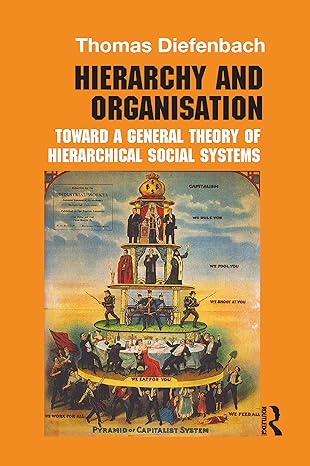Go back


Hierarchy And Organisation Toward A General Theory Of Hierarchical Social Systems(1st Edition)
Authors:
Thomas Diefenbach

Cover Type:Hardcover
Condition:Used
In Stock
Shipment time
Expected shipping within 2 DaysPopular items with books
Access to 30 Million+ solutions
Free ✝
Ask 50 Questions from expert
AI-Powered Answers
✝ 7 days-trial
Total Price:
$0
List Price: $99.97
Savings: $99.97(100%)
Solution Manual Includes
Access to 30 Million+ solutions
Ask 50 Questions from expert
AI-Powered Answers
24/7 Tutor Help
Detailed solutions for Hierarchy And Organisation Toward A General Theory Of Hierarchical Social Systems
Price:
$9.99
/month
Book details
ISBN: 1138195065, 978-1138195066
Book publisher: Routledge
Get your hands on the best-selling book Hierarchy And Organisation Toward A General Theory Of Hierarchical Social Systems 1st Edition for free. Feed your curiosity and let your imagination soar with the best stories coming out to you without hefty price tags. Browse SolutionInn to discover a treasure trove of fiction and non-fiction books where every page leads the reader to an undiscovered world. Start your literary adventure right away and also enjoy free shipping of these complimentary books to your door.
Book Summary: Most people take the conditions they work and live in as a given, believing it to be normal that societies are stratified and that organisations are hierarchical. Many even think that this is the way it should be - and are neither willing nor able to think that it could be otherwise. This book raises the awareness of hierarchy, its complexity and longevity. It focuses on a single but fundamental problem of social systems such as dyads, groups, organisations and whole societies: Why and how does hierarchical social order persist over time? In order to investigate the question, author Thomas Diefenbach develops a general theory of the persistence of hierarchical social order. This theory interrogates the problem of the persistence of hierarchical social order from very different angles, in multi-dimensional and interdisciplinary ways. Even more crucially, it traces the very causes of the phenomenon, the reasons and interests behind hierarchy as well as the various mechanisms which keep it going.This is the first time such a theory is attempted. With the help of the theory developed in this book, it is possible to interrogate systematically, comprehensively and in detail how mindsets and behaviours as well as societal and organisational structures enable the continuation of hierarchy
Customers also bought these books
Frequently Bought Together
Top Reviews for Books
Dan Herr
( 4 )
"Delivery was considerably fast, and the book I received was in a good condition."










